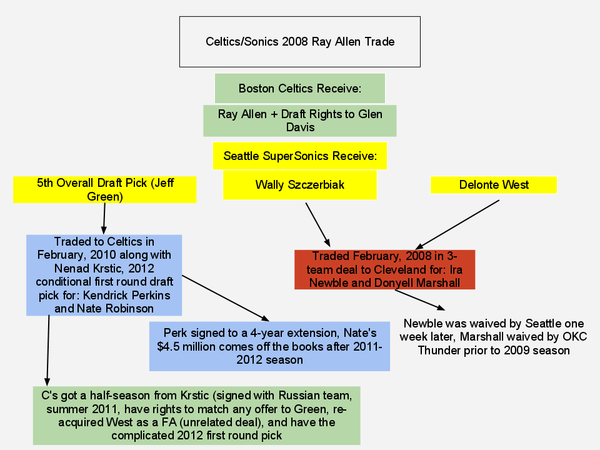One of the most difficult things to accomplish in the now expired CBA was executing a trade that would be relatively fair for each team involved. Most of the time, it would involve a contending team sending draft picks, young/cheap talent and perhaps an expiring deal for a superstar or all-star caliber player to push them over the top. The Celtics were one of the beneficiaries of such deals with the famous Kevin Garnett trade from July 31st, 2008. Tom Ziller at SB Nation recently did a masterful job compiling the final tally of the KG trade.
Taking it a step further, I decided to do the same thing with the Ray Allen trade. All aspects of that deal are very close to being finalized with a couple of exceptions that I will explain later. View my admittedly amateur-ish attempt at the graphic below, outlining the flow of that deal and what is left today:
A few things to point out that have yet to be settled:
- Ray Allen is a FA after this season
- Jeff Green is a RFA right now, so C's could have just "rented" him for half of a season
- Glen Davis is a FA right now, but got very good production from him, especially being a 2nd round pick
- Delonte and Wally were essentially traded by Seattle/OKC for Newble and Marshall, two players that were acquired to help clear cap space
- Nate Robinson currently holds the ever-highly valuable tag as "expiring contract," so he could be used in a future deal, thus giving OKC a little something extra on the final tally
- The complex 2012 first round pick that the C's received in the Perk deal is detailed here, and it may be years until we know who it is
If you wanted to look at it with extra bright-tinted green glasses, the Celtics got Ray Allen, Glen Davis, Jeff Green, half of a season from Krstic and a 2012 1st rounder for Perk, Nate and half seasons from Wally Szczerbiak,Delonte West and Donyell Marshall, and a week of Ira Newble. Looking at it that way, it's fair to say that the Celtics not only made out on the KG trade big time, but on the Ray Allen one as well.
It also shows how a big market (Celtics) dealt with two small markets (Minnesota, Seattle/OKC) and one of them was smart while the other was not. Sam Presti clearly did better than Kevin McHale (and David Kahn later on, trading a lot of the assets McHale acquired). It's just another example of how small markets can succeed in trades, albeit have a smaller margin for error.
Minnesota didn't get a terrible deal, in fact they got solid pieces but the difference is what they did with those pieces going forward versus what OKC did. Again, there are a few details to be ironed out, but for the most part this illustrates just how astonishingly well Ainge did overall in these trades.
Add The Sports Daily to your Google News Feed!
